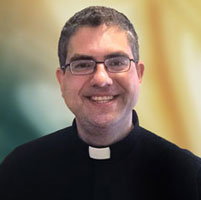By Father Michael W. Panicali

This past school year saw a particularly astute and inquisitive group of third-graders at St. Mark Catholic Academy in Sheepshead Bay. One particular, memorable visit to their classroom in April produced questions that ranged from the simple, to the theologically complex. Inquiries came fast and furious: “How is it that the (Eucharistic) hosts are perfect circles? Did Jesus eat hosts like this? What was the bread that He ate like?” These queries gave way to what has been raised by children, adults, the people of Jesus’ time, and the greatest of theologians throughout the history of Christendom: “How can the Eucharist be the Body of Christ? Isn’t it just regular bread? Is the host still bread, or is it something different? Doesn’t it still taste and look the same as what it was before?”
Rewind 2,000 years to today’s Gospel, and Jesus’ Jewish audience “murmured about Jesus because He said, ‘I am the bread that came down from heaven,’ and they said, ‘Is this not Jesus, the son of Joseph? Do we not know His father and mother? Then how can He say, ‘I have come down from heaven’?” (John 6: 41, 42).
Like the Jewish audience, we faithful, in reading and praying these past few weeks over what is known as the Gospel of John’s ‘Bread of Life Discourse,’ naturally wrestle with and struggle over what constitutes Jesus’ Sacramental Presence in the Eucharist, and the eating of His Body and drinking of His Blood. This is healthy — and what we uncover is among the many facets of the transcendent nature of our belief system as Catholics. There is nothing macabre — and dare I say, cannibalistic — about receiving, as we do in the Eucharistic, the Body and Blood of Jesus. We do not believe that we are feeding on the muscle and sinews of the tortured Jesus on the Cross. Not at all; Jesus defeated death and sin — and was raised to life — and wants us to share in that resurrected life.
Biblical scholar Neal M. Flanagan, O.S.M., in his treatment of the Gos- pel of John in The Collegeville Biblical Commentary (The Liturgical Press, Collegeville, Minnesota, copyright 1989, Dianne Bergant, C.S.A. and Robert J. Karris, O.F.M., general editors) writes that “the Eucharistic nourishment provided by the flesh and blood of the Son of Man … is not the physical flesh and blood of the earthly Jesus [that] we are asked to eat and drink but the spiritual, Spirit-filled flesh and blood of the heavenly Son of Man” (p. 991-992).
The Eucharist is about glory! That same vivifying power that rose Our Lord and Savior Jesus Christ from the dead is communicated to us and brought into us in the Eucharist. The accidental qualities of bread and wine are still present in the bread and wine once it is consecrated. But the substance of this bread and wine is now radically, miraculously changed — into the very Spiritual Presence of Jesus.
This is worth repeating. We Catholics believe the substance of what was ordinary bread and wine, is transferred to the Presence of Jesus– hence the term transubstantiation, which is in very simplistic terms, a switching across from one substance to another. We believe that the substance of what was bread and wine, is transferred to the Resurrected Body and Blood, Soul and Divinity of Jesus Christ, Our Lord. As we ingest the consecrated Eucharist, God comes into our bodies and our lives in a very real, yet obviously and understatedly, very mysterious and mystical, way. Flanagan summarizes, “Jesus is first of all the giver of the bread, a new Moses. He is also the bread of wisdom and revelation who nourishes all who come to Him in faith. He is, finally, the Eucharistic source of eternal life for all who eat and drink the flesh and blood of the heavenly and glorified Son of Man” (p. 992). We Catholics glory in what we do not understand, and accept in faith. This certainly applies to the Eucharist. Whether we are in the third grade, or the third-oldest person in our parish, the Bread of Life will always invite mystery, generate awe, and solicit trust in what we can never really understand — this side of eternity, anyway.
“In our inmost being, we shall be wholly sanctified by the very Lord Jesus Christ whom we believe to be present in His sacraments, and whose boundless power abides forever.” — Gaudentius of Brescia, contemporary of St. Augustine
Readings for the Nineteenth Sunday in Ordinary Time
1 Kings: 19:4-8
Ephesians: 4:30—5:2
John: 6:41-51
Father Panicali is the parochial vicar for St. Mark-St. Margaret Mary Parish, Sheepshead Bay and Manhattan Beach, and local chaplain of Rosary for Life.
